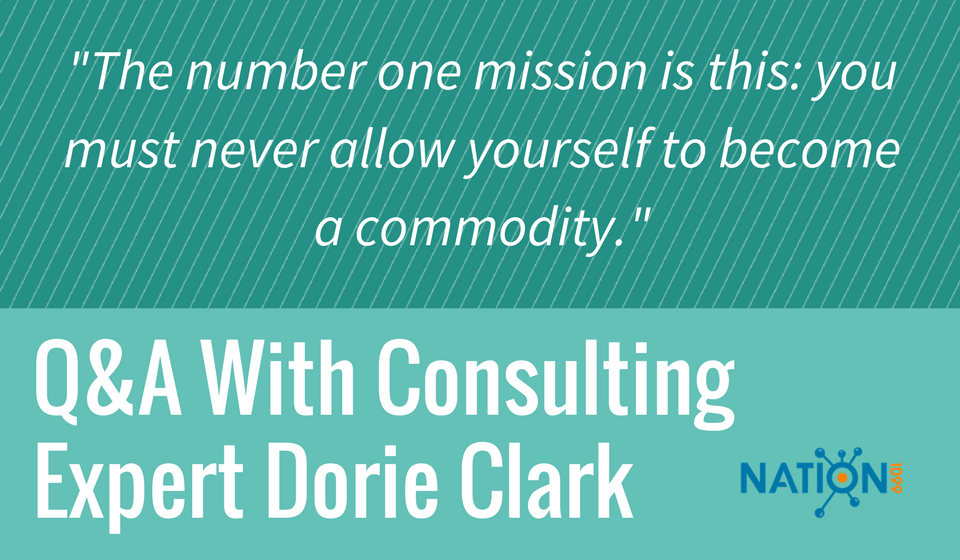If you’re like me, you probably keep seeing Dorie Clark’s byline in The Harvard Business Review and reading her pieces hungrily. She’s providing some of the only business and strategy advice out there relevant to how work is shifting toward consulting and freelancing. In fact she’s written a whole book about it, Entrepreneurial You.

Dorie Clark.
© 2014 Marilyn Humphries
This follows up on previous books, Reinventing You and Stand Out. Dorie is an adjunct professor at the Duke University Fuqua School of Business, and she is also a well-known keynote speaker. You may have seen her occasionally in your TED Talks feed, advising everyone from corporate leaders to solopreneurs on personal branding and networking. As she notes below, this is only a partial list of her gigs.
I wanted to get Dorie’s take on the connection between entrepreneurship and a freelance career, and she kindly agreed to this written interview.
Related reading:
- Career Prep for Independent Work: A Q&A With MBA Prof Diane Mulcahy
- Semi-retirement Jobs In the Gig Economy: Interview With Career Expert Nancy Collamer
One issue that comes up a lot at Nation1099 is what counts as a freelancer since our sources of income might include fees for services, speaking fees, sale of products and receipts from patients or clients in a “private practice” model. Do you consider yourself a freelancer, consultant, independent contractor or something else entirely?
Though many might consider the terms interchangeable, I consider myself a consultant, rather than a freelancer.
To me, the term “consultant” implies a certain level of brand recognition and expertise. You hire a consultant to advise you strategically, whereas a “freelancer” or “independent contractor” often connotes simply an extra pair of hands that you bring in from outside the company.
However, I recognize that others may view the terminology differently!
Related reading: Why Career Expert Nancy Collamer Calls Herself A Business Owner Rather Than A Freelancer
How about the audience you are speaking to in your book Entrepreneurial You? Do you see them as freelancers?
In Entrepreneurial You, the abiding theme is the importance of building a brand and marketplace positioning that allows you to charge what you’re worth. Many readers may be freelancers (as in, they work for themselves), but to the point above, I want to help people get out of the “hired hand” category and into the “recognized expert” category.
One of our pet theories here is that even people in jobs are adopting the working styles of freelancers. (Temporary, hybrid teams; job hopping; project oriented rather than role oriented; remote work.) Is this blurring of the lines between “jobs” and “independent work” part of the phenomenon that you are writing about?
I agree that this phenomenon is increasingly prevalent. My friend Amy Edmondson has done great reseach about it in her book Teaming, and it’s certainly part of the ethos that informs Entrepreneurial You.
What would you advise someone who is perfectly satisfied in a traditional role-based career? Are they necessarily going to have to pay attention to the trends you are writing about?
For sure, traditional salaried employees are going to have to start thinking seriously about the entrepreneurial economy.
One reason is that — as we’ve all endlessly heard — tech trends like AI and robotics will be disrupting various industries imminently. Certainly the Internet has already done so in many fields, as I experienced personally when I was laid off from my newspaper reporting job in 2001.
Even if you have a salaried job and love it, I advise everyone to create a side income stream, whether that’s doing a bit of coaching or consulting, starting an Etsy business, etc. This helps hedge against economic disruption, gives you potential economic upside and has the added benefit of enabling you to test out and learn new skills.
Related reading: When Do I Start Freelancing Full-Time?
I think most freelancers lack an entrepreneurial mindset. That might sound counterintuitive, because we’ve taken a risk to go solo and be responsible for our own income. But that seems like too limited a definition of entrepreneurship. How would you define entrepreneurship when it comes to building a freelance business?
Many freelancers or independent contractors define their version of entrepreneurship by what it’s not: they’re not working for a traditional employer, or they’re no longer salaried, 9-to-5 employees. They may still do very similar tasks, but perhaps for a few clients instead of just one.
But if we take Michael Gerber’s old-but-wise advice of “working on the business, rather than in the business” – meaning, thinking about how to grow your enterprise rather than just performing a task – then you can achieve meaningful growth and revenues.
What are some things freelancers can do to be entrepreneurial?
If you’re a freelancer, you’re almost always more diversified from a risk perspective than a traditional employee, because you presumably have multiple clients. If one dries up, you have other ways of staying afloat.
But the real magic of entrepreneurship, which I hope more freelancers come to embrace (and which I talk about extensively in Entrepreneurial You) is creating multiple income streams, where you’re doing multiple types of activities for your client base. That limits your risk even more and gives you enormous upside.
In my case, over the years I’ve cultivated nine different income streams: consulting, coaching, writing books, keynote speaking, business school teaching, affiliate income, online courses, in-person live events and mastermind groups.
Related reading: How to Find a Mastermind Group for Freelancers . . . Or to Start and Run One Yourself
Let me give a typical case that many of our readers are facing. In some fields — freelance writing, for example — there is tremendous downward price pressure because of changes in technology and in the economics at our traditional clients. How can that freelancer think entrepreneurially to thrive instead of just survive?
The number one mission is this: you must never allow yourself to become a commodity.
Any American, or Westerner, will always lose the price war because our cost of living is just too high. We can only succeed if we position ourselves as recognized experts whom clients specifically want to seek out because they know we’re excellent at what we do.
Conversely, if I’m in a domain where there is high demand — software engineering, for example — I can seemingly charge the high hourly fees that the market can bear, and all is well. How should that person be thinking entrepreneurially?
One possible next step is to avoid charging hourly at all. Alan Weiss has written convincingly that that arrangement ultimately shortchanges consultants/freelancers.
If you’re creating great value for the client, a much fairer and more aligned solution is to have project-based pricing, or what Weiss calls “value based pricing.”
Related reading: The Value Pricing Mindset: 4 Questions to Reveal Your Client Value
That Alan Weiss book had a big influence on how I thought about my own business a couple years ago. How about your approach to your business? What is the strategic thinking that has gone into building your career?
As I describe in my Recognized Expert course, there are three key ingredients in building a professional reputation so strong, it will attract clients to you: content creation, social proof, and your network. You need to create content because without doing so, it’s almost impossible for people to know what your ideas are (and if they’re any good).
Sharing your ideas allows you to attract like-minded collaborators and clients to you. To that end, I’ve written more than 500 articles (available on my website for free here) over the past eight years for sites like Forbes, Entrepreneur and The Harvard Business Review.
Social proof refers to your credibility: what is it about you that encourages others to listen to you and take you seriously? I’ve worked hard to cultivate relationships with entities like my publisher, Harvard Business Review Press, and the business school where I teach, Duke University’s Fuqua School of Business, which already have strong brands in the marketplace.
Finally, your network is important because they help you hone your ideas and inspire you, and also to spread your ideas more widely. Just as one example, I’ve hosted dinner gatherings in NYC over the past 3 ½ years that have brought together more than 250 authors and entrepreneurs, many of whom have become close friends.
Through following these three principles, I’ve been able to work my way up to premium positioning and pricing, which has made my business much more enjoyable and lucrative. I hope Entrepreneurial You will enable the same for others, as well.
After Entrepreneurial You, check out Dorie’s other books

Robert McGuire
Publisher of Nation1099
Robert McGuire is the owner of McGuire Editorial, a content marketing services firm specializing in B2B and tech startups.











